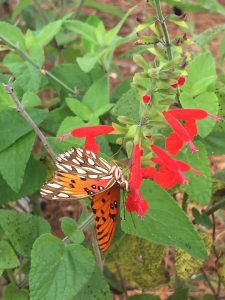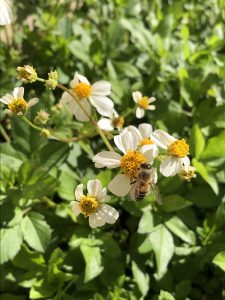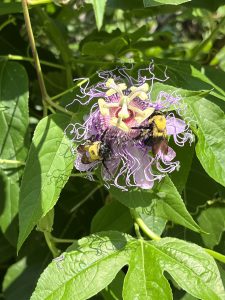
If you’ve noticed a decline in butterflies, bees and birds, you’re not alone. Worldwide, pollinators are in drastic decline. Approximately 3 billion birds from the United States to Canada are gone, and 90% of monarch butterflies in North America have vanished. And for the first time in history, bees are now listed on the endangered species list. These include the rusty patched bumblebee, and 7 species of yellow-faced bees endemic to Hawaii. Although the decline can’t be traced to a single cause, we know for fact that we need pollinators, and pollinators need us (Pollinator Partnership).
Pollinators are so much more than honey bees and butterflies. They are also moths, beetles, flies, wasps, nectar-feeding bats, and native bees. Florida alone has over 300 species of native bees! (see Know Your Native Pollinators).
This week we hope that you will celebrate pollinators with us by planting a native plant. Of the many causes for the decline in pollinators, loss of native habitat is one of the biggest. While Florida-friendly non-native plants have their uses (many of which are highly attractive to pollinators) there is no substitute for supporting our pollinators like native plants that have evolved together.
Before selecting your native plant to add to your garden, always keep in mind the first rule of Florida-Friendly Landscaping: Right Plant, Right Place. Even a native plant if planted in the wrong place will not thrive or survive. In some cases, like what I experienced with passionflower, it may actually survive too well and can smother your garden. So, know your climate (Marion County is in plant hardiness zone 9a), be aware if the plant needs full sun or full shade, do your soil moisture conditions match what the plant needs (ex. don’t put a swamp milkweed in a dry sand dune. I’ve tried it – it didn’t end well), and make sure the plant has enough room to accommodate its mature size. That was a mistake I had made once with passionflower vine, not realizing how large it was going to get and how far its tendrils could reach.

Now that you have a plan based on your site conditions, it’s time for the fun part – plant shopping! I have here a presentation and list of some of my favorite native plants that usually do excellent in north-central Florida and need little maintenance once established. A plant is established when it has put out enough roots to sustain itself and will generally no longer need irrigation. But it’s imperative that you provide regular water until it gets to that point of self-sufficiency. Trees may take up to a year and half before they are fully established, large shrubs around 6 months, small shrubs and woody plants 3 – 6 months, and then smaller more herbaceous plants are usually established after a couple of months.
As to where to buy plants, we cannot recommend specific nurseries, but our UF/IFAS Marion County Master Gardeners have worked hard to build up their inventory of native plants that they are proud to sell at our two annual plant sales in May and October. Not to mention, you can also find many great native and Florida-friendly plants at our annual Spring Festival that is the second weekend of every March. Check our website and Facebook page to stay up to date on future events and plant sales. The Florida Association of Native Nurseries website is also an excellent resource to learn more about native plants and where to purchase them in the state.

If you have questions or want further recommendations for your native landscaping, call or visit your UF/IFAS Marion County Extension Service at 352-671-8400. We also have some lovely demonstration gardens that are always open to the public where you can see for yourself many of these wonderful plants at 2232 NE Jacksonville Rd., Ocala, 34470. Not in Marion County? No worries, there is a UF/IFAS Extension Service in every county of the state (Find my Extension Office). Happy Gardening!
 2
2
